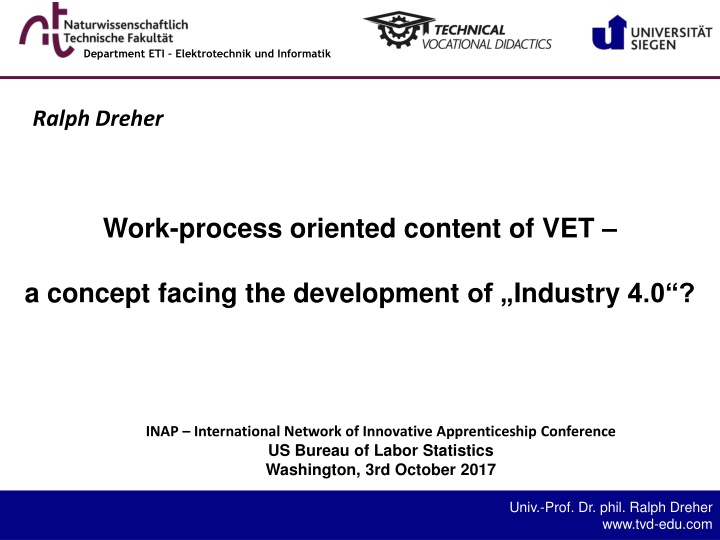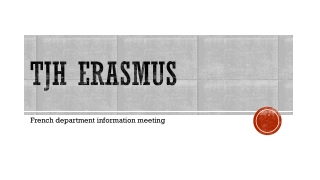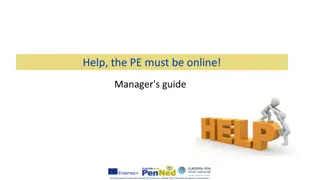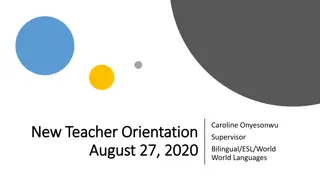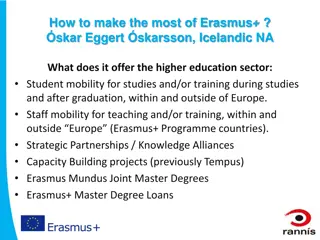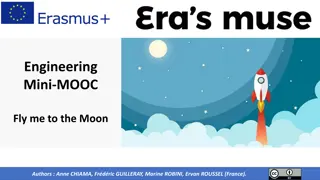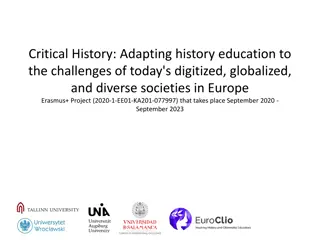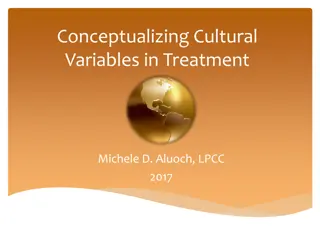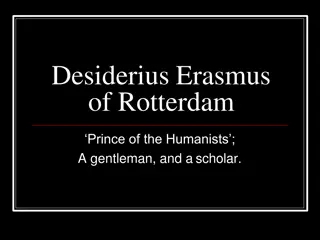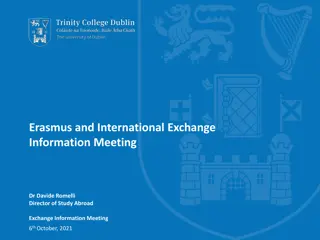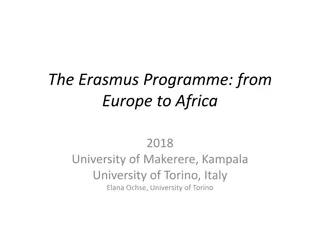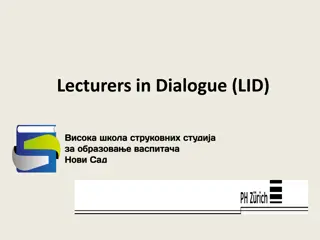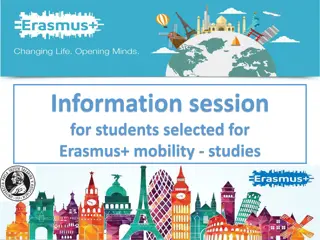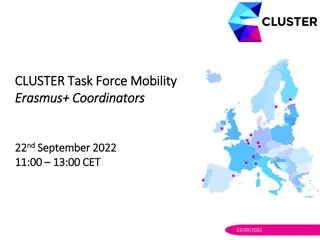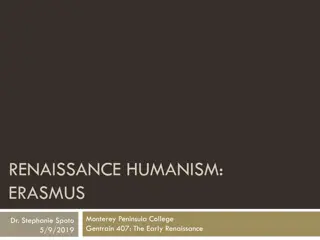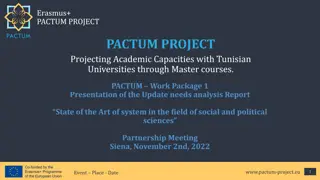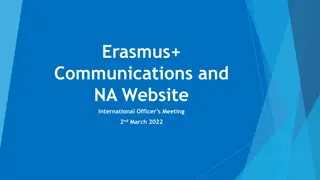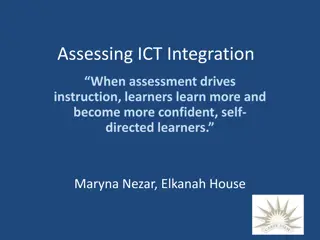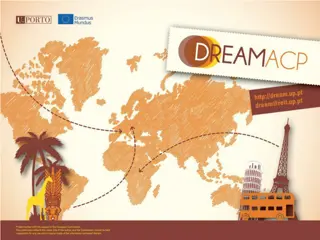Erasmus+ Project for Multicultural Education Development
This Erasmus+ project focuses on developing a Pedagogical and Didactic Participatory teaching and learning model to foster multicultural and multi-religious citizenship in European schools. The project involves various educational institutions from Italy, Spain, Bulgaria, Greece, and Turkey, aiming to promote pluralism and mutual understanding among pupils, teachers, headmasters, and parents. The methodological approach includes presenting different religious positions, promoting knowledge, suspending personal biases, empathizing with others, and distinguishing between understanding and judgment. The project includes participatory workshops with experts and teachers, as well as laboratory workshops with children to express perceptions of cultural identity and diversity in Europe.
Uploaded on Mar 02, 2025 | 1 Views
Download Presentation

Please find below an Image/Link to download the presentation.
The content on the website is provided AS IS for your information and personal use only. It may not be sold, licensed, or shared on other websites without obtaining consent from the author.If you encounter any issues during the download, it is possible that the publisher has removed the file from their server.
You are allowed to download the files provided on this website for personal or commercial use, subject to the condition that they are used lawfully. All files are the property of their respective owners.
The content on the website is provided AS IS for your information and personal use only. It may not be sold, licensed, or shared on other websites without obtaining consent from the author.
E N D
Presentation Transcript
Department ETI Elektrotechnik und Informatik Ralph Dreher Work-process oriented content of VET a concept facing the development of Industry 4.0 ? INAP International Network of Innovative Apprenticeship Conference US Bureau of Labor Statistics Washington, 3rd October 2017 Univ.-Prof. Dr. phil. Ralph Dreher www.tvd-edu.com
Department ETI Elektrotechnik und Informatik What means Industry 4.0 (IoT-Production, Digitalisation)? New contents for gainful employment? What consequences can be derived for state-of-the art VET (didactical question)? Answering the core-question: Is action-oriented VET-Didactic a suitable answer? Outlook: Design-orientation as standard in VET Univ.-Prof. Dr. phil. Ralph Dreher www.tvd-edu.com Summary dreher.tvd@uni-siegen.de
Department ETI Elektrotechnik und Informatik Self-steering bending-machine steering of bending beam by Expert - System Machine- Learning- Interface instead of User- Interface Principle Squeeze out like a lemon : automatical recognizing of material Best-case work-process-knowledge becomes an algorithmen - The worker with his work-process-knowledge will be always less needed . Expert-System What means Industry 4.0? Case I Univ.-Prof. Dr. phil. Ralph Dreher www.tvd-edu.com dreher.tvd@uni-siegen.de
Department ETI Elektrotechnik und Informatik Dashboards for OEM (Automotive Industry) Principle of Industrial 4.0 : OEM-order High qualified work is design-oriented to optimize the self-learning Expert-System, make troubleshooting for the Expert-System. (after Customer-contract) just-in-time-delievery Self-learning Expert-System quality control buffer of orders (Dreher 2016) Low qualified work is work-process-oriented to build-up of the production plant, to maintain the production plant by using schedules ordering material (OEM- specification) material storage or error-logs. bill-payment (fixed price) What means Industry 4.0? Case II Univ.-Prof. Dr. phil. Ralph Dreher www.tvd-edu.com dreher.tvd@uni-siegen.de
Department ETI Elektrotechnik und Informatik High qualified work is design-oriented to optimize the self-learning Expert-System make troubleshooting for the Expert-System. YES (Dreher 2016) YES NO NO Low qualified work is work-process-oriented to build up of the production plant, maintain the production plant by using schedules or error-logs. New content for gainful employment? Univ.-Prof. Dr. phil. Ralph Dreher www.tvd-edu.com dreher.tvd@uni-siegen.de
Department ETI Elektrotechnik und Informatik Take responsibility to design procedures Aim of Vocational Education: Analyzing the (production)-enviroment by using Big Data / Sensor-Data; Visualizing Expert-System-(Re)Action; Controlling the Expert-Systems; Collecting experience by using networks. New content for gainful employment ! Univ.-Prof. Dr. phil. Ralph Dreher www.tvd-edu.com dreher.tvd@uni-siegen.de
Department ETI Elektrotechnik und Informatik Generating Digitization Problem-Solve- Knowledge Networking Design-orientation Automation Work-Process- Knowledge Work-planing Action-orientation Industrialisation Specific knowledge Science-orientation Skills Craftmenship, Trade Primary virtues Imitatio - Principle (developed from Sp ttl/Dreher, 2009) 2 What consequences can be derived for state-of-the art VET? Univ.-Prof. Dr. phil. Ralph Dreher www.tvd-edu.com dreher.tvd@uni-siegen.de
Department ETI Elektrotechnik und Informatik Responsible solution Design-orientation REFLECTING Why ? Know-Why Master solution REALIZING Action-orientation How? Know-How Theoretical solution Science-orientation UNDERSTANDING What? Know-That Traditional solution Imitatio - Principle DOING What consequences can be derived for state-of-the art VET? Univ.-Prof. Dr. phil. Ralph Dreher www.tvd-edu.com dreher.tvd@uni-siegen.de
Department ETI Elektrotechnik und Informatik Four stage-model of competence, designed by Noel Burch, published by Abraham Maslow, 1954 Process during Reflection Realistic Level of Apprenticeship Best-case- working- Process as didactical base Action-oriented VET- Didactic is NOT the answer! Because it is based on well known work-processes and their analysis. Univ.-Prof. Dr. phil. Ralph Dreher www.tvd-edu.com Answering the question: dreher.tvd@uni-siegen.de Is action-oriented VET-Didactic a suitable answer?
Department ETI Elektrotechnik und Informatik Feature Meaning Example Education instead of training as core target Not the training of skills and procedures, but the competence of reponsible solving of problems must be the aim of VET. Realizing process- Optimization, improving sustain-ability, developing better empathy, Individual solution, not Master-solution as result of a learning-situation Multi-result learning tasks to develop own solutions Optimize the cutting process , NOT Calculate the cutting data as a task Reflection after Realization Reflection must be a teacher- generated part of VET Social, economic and ecological impact assesment as a continious part of a learning situation Know-why, not Know-how as taxonomical level The process of up-building unconscious competence and to stop complacency Not using a solution, understanding the value of a solution Science and Apprenticeship in combination I 4.0 need a good practical AND a mathmatic-theoretical knowledge Combinig BA- and Apprenticeship-Courses ( Hybrid VET ) Univ.-Prof. Dr. phil. Ralph Dreher www.tvd-edu.com Outlook: dreher.tvd@uni-siegen.de Design-orientation as standard in modern VET
Department ETI Elektrotechnik und Informatik Four stage-Model of competence, designed by Noel Burch, published by Abraham Maslow, 1954 Problem of recording (Yuen 2017) Process during reflection Realistic level of Apprenticeship Best-case work- process as didactical base Action-oriented VET- Didactic is NOT the answer! Because It based on well known work-processes and their analyse. We need a VET-Didactic which develop an unconcious competence and the personal prerequisite to reflect vocational decisions and actions! Univ.-Prof. Dr. phil. Ralph Dreher www.tvd-edu.com Outlook: dreher.tvd@uni-siegen.de Design-orientation as standard in VET
Department ETI Elektrotechnik und Informatik Feature Meaning Example Education instead of training as core target Not the training of skills and procedures, but the competence of reponsible solving of problems must be the aim of VET. Realizing process-Optimization, improving sustain-ability, developing better empathy, Individual solution, not Master- solution as result of a learning- situation Multi-result learning tasks to develop own solutions Optimize the cutting process , NOT Calculate the cutting data as a task Reflection after Realization Reflection must be a teacher-generated part of VET Social, economic and ecological impact assesment as a continious part of a learning situation Know-why, not Know-how as taxonomical level The process of up-building unconscious competence and to stop complacency Not using a solution, understanding the value of a solution Yuen, 2017: Science and Apprenticeship in combination I 4.0 need a good practical AND a mathmatic-theoretical knowledge Combinig BA- and Apprenticeship- Courses ( Hybrid VET ) Developing strategies to record, to verbalize and to transfom tacit- knowldge (Polanyi 1958) as main task within I 4.0-Industry by using the example of unscrewing explaind by Adolph, 2001 Development of tacit - knowledge, not re-invent of work-process- knowledge Requirement to build up predictive analytics as main advantage of I 4.0. Giving the possibility to verbalize and to codify tacit-knowledge Univ.-Prof. Dr. phil. Ralph Dreher www.tvd-edu.com Outlook: dreher.tvd@uni-siegen.de Design-orientation as standard in VET
Department ETI Elektrotechnik und Informatik Adolph, Gottfried: Wissensaneignung durch Handeln und Gestalten. In: Fischer, Martin, Heidegger, Gerald, Petersen, Willi und Sp ttl, Georg (Hrsg.): Gestalten statt Anpassen in Arbeit, Technik und Beruf. Festschrift zum 60. Geburtstag von Felix Rauner. Bielefeld: Bertelsmann, 2001, S. 171 188 Dreher, Ralph: Industrie 4.0: Ein Anwendungsfall f r die Verantwortung bei gestaltungsorientierter Ingenieurarbeit. In: Kammasch, G., Klaffke, H., Knutzen, S (hrsg.): Technische Bildung im Spannungsfeld zwischen beruflicher und akademischer Bildung. Die Vielfalt der Wege zu technischer Bildung. Siegen, 2016, S.71-76 Maslow, A. H.: Motivation and Personality, New York 1954. Polanyi, M.: Personal Knowledge. Towards a post-critical philosophy. The University of Chicago Press, Chicago IL 1958 Sp ttl, Georg & Dreher, Ralph: Gestaltungsorientierung als didaktische Konzeption in der Berufsbildung. In.: Bonz, B.: Didaktik und Methodik der Berufsbildung. Band 10 der Schriftenreihe Berufsbildung konkret. Baltmannsweiler 2009. S. 217 - 229 Yuen, Sui .P.: Measuring Experience-Knowledge as factor for Industry 4.0 (Industrial Internet of Things). University of Siegen, Internal Paper, 2017. Univ.-Prof. Dr. phil. Ralph Dreher www.tvd-edu.com Bibliograpy dreher.tvd@uni-siegen.de
Department ETI Elektrotechnik und Informatik Thank you ! http://www.tvd-edu.com/downloads.html (under: Pr sentation INAP 2017 ) Univ.-Prof. Dr. phil. Ralph Dreher www.tvd-edu.com dreher.tvd@uni-siegen.de
